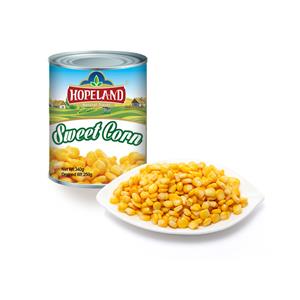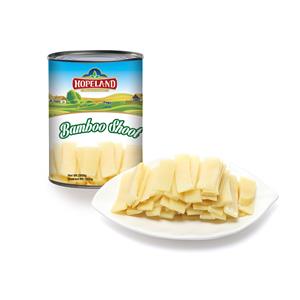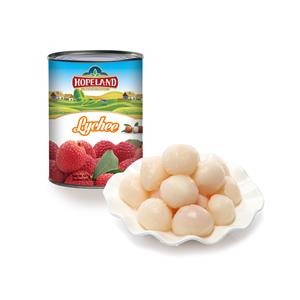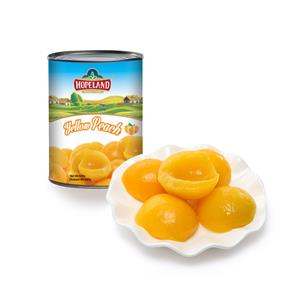Everything You Need to Know About Canned Water Chestnuts
Water chestnuts—crunchy, mildly sweet, and refreshingly juicy—are a staple ingredient in many Asian dishes. But what happens when fresh water chestnuts are out of season or hard to find? That’s where canned water chestnuts step in. Convenient, shelf-stable, and versatile, they bring the same signature texture and taste to your kitchen without the hassle of peeling and prepping.
In this blog, we’ll explore everything you need to know about canned water chestnuts: their origin, how they’re made, their nutritional profile, culinary applications, and why they deserve a spot in your pantry.
1. What Are Water Chestnuts?
Despite the name, water chestnuts aren’t actually nuts. They are the corms (bulb-like underground stems) of the aquatic plant Eleocharis dulcis, commonly found in marshy areas of Asia, particularly in southern China. These crunchy tubers are usually eaten raw or cooked and are valued for their crisp texture and slightly sweet flavor.
Water chestnuts have been cultivated in China for over 3,000 years. In Chinese cuisine, they are often used in stir-fries, dim sum, soups, and desserts. Their ability to retain a firm texture even after cooking makes them especially popular in dishes where contrast in texture is key.
2. From Field to Can: How Canned Water Chestnuts Are Made
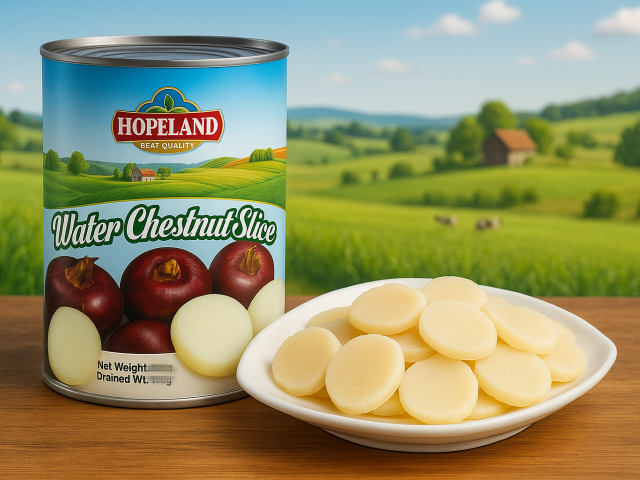
The production process for canned water chestnuts ensures both safety and convenience while preserving their signature crispness.
Step 1: Harvesting
The harvesting season usually starts in late autumn, when the water chestnuts reach full maturity. Workers extract the corms from muddy fields, rinse off dirt, and sort them based on size and quality.
Step 2: Peeling and Cleaning
After harvesting, the water chestnuts are mechanically or manually peeled. Any damaged or discolored parts are removed. The cleaned corms are then soaked in water to prevent discoloration.
Step 3: Blanching and Sterilization
To preserve texture and safety, the corms undergo a blanching process—brief exposure to hot water or steam. Then, they are packed into cans filled with water or lightly salted brine.
Step 4: Sealing and Cooking
Once sealed, the cans are heat-treated in large retort systems to kill bacteria and enzymes, ensuring shelf stability. This process allows the canned water chestnuts to retain their signature crunch without the need for preservatives.
Step 5: Labeling and Packaging
Finally, the cans are cooled, labeled, and packed for shipment. Canned water chestnuts are usually available in sizes like 227g, 425g, and 567g, often with options for whole, sliced, or diced formats.
3. Nutritional Benefits of Canned Water Chestnuts
Canned water chestnuts aren’t just tasty—they’re also packed with health benefits. Here’s a breakdown of their nutritional profile per 100g (based on USDA data):
Calories: ~97 kcal
Carbohydrates: ~23.9g
Dietary Fiber: ~3g
Protein: ~1.4g
Fat: 0g
Potassium: ~584 mg
Vitamin B6, Riboflavin, and Copper
Let’s explore some of the key health benefits:
1. High in Fiber
Water chestnuts are a good source of dietary fiber, which helps with digestion, supports gut health, and may reduce cholesterol levels.
2. Low in Calories and Fat
They are virtually fat-free and low in calories, making them ideal for those watching their weight or following a low-fat diet.
3. Rich in Antioxidants
Water chestnuts contain ferulic acid, an antioxidant that can help fight inflammation and protect cells from oxidative damage.
4. Heart Health
The high potassium content supports heart function by helping regulate blood pressure levels.
5. Naturally Gluten-Free
Canned water chestnuts are naturally gluten-free, which makes them a safe ingredient for those with celiac disease or gluten sensitivities.
4. How to Use Canned Water Chestnuts in the Kitchen
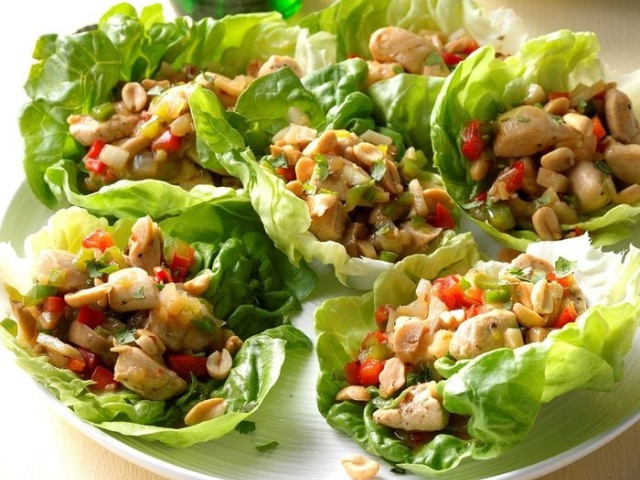
One of the best things about canned water chestnuts is their versatility. With a neutral, slightly sweet taste and crunchy texture, they complement both savory and sweet dishes. Here are some popular culinary uses:
1. Stir-Fries
Add sliced or diced water chestnuts to your favorite stir-fry for a refreshing crunch. They pair well with vegetables, tofu, chicken, beef, or shrimp. Try them in classic Chinese dishes like Kung Pao Chicken or Moo Goo Gai Pan.
2. Spring Rolls and Dumplings
Use water chestnuts in the filling for spring rolls, wontons, or dumplings. Their crunch provides a pleasing contrast to soft ingredients like ground meat or mushrooms.
3. Salads
Toss sliced canned water chestnuts into salads for added texture. They work well in both leafy green salads and grain-based options like quinoa or couscous.
4. Soups
Drop whole or sliced chestnuts into soups and hotpots. They hold up well during boiling and add subtle sweetness to broths.
5. Appetizers
Wrap them with bacon and bake—bacon-wrapped water chestnuts are a classic party snack that's crispy, salty, and crunchy.
6. Desserts
In Chinese cuisine, water chestnuts appear in sweet dishes such as water chestnut cake (马蹄糕), especially during festivals. You can also blend them into fruit salads or use them in chilled coconut milk desserts.
5. Storage and Shelf Life
Canned water chestnuts are shelf-stable and can be kept at room temperature until opened. Here are some tips for proper storage:
Before Opening
Store in a cool, dry place.
Avoid exposure to direct sunlight or extreme heat.
After Opening
Transfer unused water chestnuts to an airtight container.
Submerge them in fresh water and refrigerate.
Change the water daily to preserve freshness.
Use within 3–5 days.
6. Why Choose Canned Water Chestnuts?
If you’re wondering why you should pick up a can instead of fresh ones, here are some compelling reasons:
✅ Year-Round Availability
Fresh water chestnuts are seasonal and harder to find outside Asia. Canned versions give you access all year long.
✅ No Peeling Required
Peeling raw water chestnuts is time-consuming and messy. Canned water chestnuts are ready to use, saving you time and effort.
✅ Long Shelf Life
With proper storage, canned water chestnuts can last 1–3 years, making them a pantry staple.
✅ Consistent Quality
Producers maintain high-quality standards to ensure uniform size, texture, and flavor across batches.
✅ Global Supply
Thanks to producers like Amoytop Foods, canned water chestnuts are exported worldwide, bringing this delicacy to kitchens in the U.S., Europe, the Middle East, and beyond.
7. Buying Tips: How to Select the Best Canned Water Chestnuts
Here are a few things to keep in mind when shopping:
Check the Label: Look for water chestnuts packed in water or light brine. Avoid added preservatives or artificial flavors.
Inspect the Can: Choose undamaged cans with no rust or bulging.
Expiration Date: Ensure the product is within its “best by” date.
Reputable Brands: Buy from trusted manufacturers with food safety certifications such as HACCP, ISO, BRC, or FDA approval.
8. Sustainability and Environmental Impact
Many water chestnut producers, especially in China, are moving toward sustainable farming practices. These include:
Water-saving irrigation systems
Reduced pesticide use
Eco-friendly packaging materials
Choosing canned products from environmentally responsible brands contributes to global efforts to reduce food waste and improve food security.
Conclusion: Add Canned Water Chestnuts to Your Pantry Today
Canned water chestnuts offer a perfect blend of convenience, flavor, and nutrition. Whether you’re recreating a traditional Chinese stir-fry, adding crunch to your salad, or exploring new dessert recipes, this humble ingredient brings freshness and texture to every dish.
With their long shelf life and versatile uses, canned water chestnuts are an excellent pantry investment—especially when sourced from reliable suppliers who prioritize quality and sustainability.
Interested in sourcing premium canned water chestnuts?
Contact us today for bulk pricing, product specifications, and export details. Let’s bring freshness and crunch to kitchens around the world, one can at a time!

